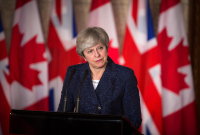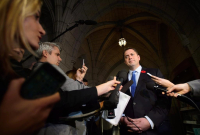Support strong Canadian climate journalism for 2025
Boris Johnson pledged a Halloween Brexit for Britain from the European Union, negotiated or not, after being sworn in Wednesday as Britain's prime minister.
With that, there is almost equal certainty that Johnson's arrival at 10 Downing Street will roil the geopolitical and economic waters for Canada as it tries to guide its trade deal with the EU into port.
With fewer than 100 days before Canada's federal election, Johnson's premiership injects more disruption into Canada's relationship with two of its top allies — Britain and the U.S. — because both are now led by unpredictably populist men who appear fond of each other.
Moments after being asked by Queen Elizabeth to form a government, Johnson pledged to take Britain "out of the EU on Oct. 31, no ifs or buts."
"We will do a new deal, a better deal that will maximize the opportunities of Brexit while allowing us to develop a new and exciting partnership with the rest of Europe based on free trade and mutual support."
Johnson said that would come with or without a departure deal. That latter option has sparked widespread concern that it would plunge Britain's economy into recession.
The transatlantic economic spillover into Canada won't be good either if there's a no-deal departure, analysts said Wednesday.
"If Britain crashes out of the EU without an agreement, Canada's trade in goods and services will almost certainly suffer not only because of the adverse economic consequences for Britain, our largest export market in the EU, but also for the rest of Europe," said Fen Hampson of the Norman Paterson School of International Affairs at Carleton University.
"We clearly have an interest in a properly managed Brexit scenario."
Either way, Canada and a Britain out of the EU will have to negotiate their own bilateral trade deal because the Canada-EU pact, known as CETA, won't apply to Britain. But getting Johnson's attention could prove difficult for Canada because he may be more focused on dealing with Trump — a fan of Johnson's — and getting a deal with the U.S., said Hampson.
Colin Robertson, the vice-president of the Canadian Global Affairs Institute, said Canada and Britain "were well down the road to negotiation of a Canada-U.K. economic partnership but then negotiations stopped when (former prime minister Theresa) May went down."
While Britain is not legally allowed to enter trade negotiations until it has actually departed the EU, High Commissioner Susan le Jeune d'Allegeershecque told The Canadian Press in April that Britain's top trade negotiator has been meeting regularly with Canadian representatives to sketch out the broad strokes of a bilateral deal.
In the meantime, it is best that Canada continue to push ratification across Europe, where France took a big step toward becoming the 14th and arguably most significant country of the EU's 28 nations to ratify the CETA this week, said Robertson. (The French Senate has yet to take a vote but the deal passed its key hurdle in France's other house, the National Assembly.)
Prime Minister Justin Trudeau spoke with French President Emmanuel Macron on Wednesday to express his appreciation for the development.
Johnson made clear that free trade is the key to his country's success moving forward from three years of uncertainty after Britons voted in 2016 to leave the EU by a 52-to-48 margin.
"It has become clear there are pessimists at home and abroad who think after three years of indecision this country has become a prisoner to the old arguments of 2016," Johnson said. "I am standing before you today to tell you, the British people, that those critics are wrong.
"The doubters, the doomsters, the gloomsters they are going to get it wrong again. The people who bet against Britain are going to lose their shirts because we're going to restore trust in our democracy," he added.
"Let's start now on those free-trade deals because it is free trade that has done more than anything else to lift billions out of poverty."
Like Trump, Johnson is unlike any previous leader of his country, perhaps with the exception of Winston Churchill, Robertson said.
Trudeau congratulated Johnson and said he looked forward to working with him. The two countries "share centuries of history and tradition. We are steadfast allies and close partners, whether defending our common values, upholding the rules-based international order, or building a more prosperous future for our citizens."
A broader concern looms for Canada with Johnson now in power, argues Achim Hurrelmann, co-director of the Centre for European Studies at Carleton University. It boils down to this: "This closeness of Johnson and Trump and this whole idea that there could be an Anglosphere alliance" that could exclude Canada.
Hurrelmann said he was troubled by last week's public displays of bonhomie between Trudeau and European Commission President Donald Tusk at their Montreal summit. Tusk heaped praise on Trudeau as a visionary leader, going well beyond the bounds of praising a partner for good bilateral relations, he said.
Tusk's remarks, including on Twitter, "read like a Liberal party campaign ad," he said.
That type of rhetoric, Hurrelmann said, is "not necessarily constructive if you're interested in having good relations with important partners."





Comments
Well, isn't that interesting, Britain, proud bastion of western democracy has been inveigled into accepting the primacy of a leader who exhibits all the skills of a demagogue and all the charms of a Trumpian disrupter. Johnson, like all his ilk is no patriot - he is a shameless self promoter, loud mouth, and probably a bully. No doubt his vision of free trade is a return to the buccaneering days of the British Empire, exploiting and impoverishing all those undesirable former colonial possessions. Such hypocrisy, such ignorance, such con-artistry - Woe betide that green and pleasant land